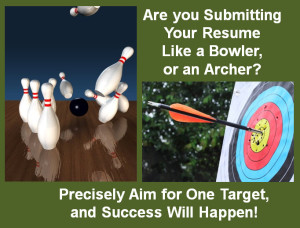Why Ambitious Interview Statements Can be Dangerous
Ambition is defined as, “an earnest desire for some type of achievement or distinction as power, honor, fame, or wealth, and the willingness to strive for its attainment” (www.dictionaryreference.com). If we use this description relative to your career path, then we can clearly see how ambition would be a very positive trait to have. Without it, you’ll have a career, but minus the path or journey that will advance you to higher  levels. For those who do have career-path goals, you have to do a bit of a balancing act during the interview to make sure you are expressing your ambition in a humble and realistic way; otherwise, you risk being passed over as the candidate who is considered a “flight risk” if the career advancement isn’t achieved within a specific timeframe.
levels. For those who do have career-path goals, you have to do a bit of a balancing act during the interview to make sure you are expressing your ambition in a humble and realistic way; otherwise, you risk being passed over as the candidate who is considered a “flight risk” if the career advancement isn’t achieved within a specific timeframe.
Isn’t it a good thing during the interview to express how you would like to grow with the company? Doesn’t that show initiative and a sincere commitment to stay employed with them? How could something positive like ambitions jeopardize a job offer?
Let’s explore five downsides of ambition that could go awry:
- You say, “I want to be a manager within five years here.” The Hiring Manager thinks, “But we don’t have a protocol for advancement in that short timeframe.”
- You say, “I’m very ambitious, and I want a company that is ambitious too.” The Hiring Manager thinks, “Sounds like you haven’t done your research about our company yet, because we have grown very slowly over the past two decades.”
- You say, “I left company xyz because, after three years, I was turned down for every promotion, and I only saw others advancing instead of me.” The Hiring Manager thinks, “Little patience with high expectations equals disappointment and short-term employment.”
- You say, “I have a lot of ideas that this company could use.” The Hiring Manager thinks, “The job opening is for a tax accountant, and we have all kinds of regulations that creativity cannot change.”
- You say, “I need to make more and more money each year because I have a growing family.” The Hiring Manager thinks, “We only give a standard 3.2% annual raise, so maybe that won’t be enough for you and your family’s budget.”
You should now be able to notice some patterns in how a Hiring Manager might be thinking about your ambitious statements. While demonstrating that you actually have a career path in mind, it’s all about how you express and assert your views on what that means to you. Remember, the Hiring Manager is always thinking how you will “fit” with the company and not about how they can “fit” into your life plan. This mindset is really important for Generations X and Y to understand because these generations are very aware of the value of competitiveness. Being the first and being the best are elements that rule the day, and being shy about talent never wins prizes.
We suggest that, along with bringing a big basket of confidence to the interview, moderation and discernment must be included in the mix to help balance the ambitious statements. Career advancements and promotions take time and merit. Proof of results can only come from your time, energy, and skills you invest in each work day. It’s not a race for it, but rather a marathon for it. Pace yourself wisely so you don’t run out of steam too early. Show the Hiring Manager that you have done your research and understand their company culture. Help them discover that you are the best “fit” because your ambition is well-balanced and centered in reality.
If you slightly harness how you’re voicing your drive, the company will feel assured in your longevity with them, and you’ll find that your hard will help you advance in a reasonable amount of time.
Do you want to explore this issue more deeply? Drop us a note at www.agi.jobs/contact and let us know how we can help.
Image Source: www.freedigitalphotos.net



